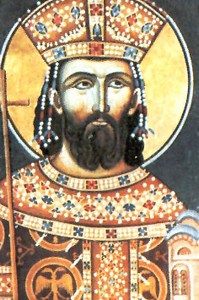Lazar of Serbia
| Lazar | |||||
|---|---|---|---|---|---|
| Prince Autocrator of all the Serbs |
|||||

Portrait of Prince Lazar in the Ravanica Monastery (1380s)
|
|||||
| Reign | 1373–1389 | ||||
| Successor | Stefan Lazarević | ||||
| Born | ca. 1329 Fortress of Prilepac near Novo Brdo, Kosovo, Kingdom of Serbia |
||||
| Died | 15 June 1389 Kosovo Polje |
||||
| Burial | Ravanica Monastery | ||||
| Spouse | Milica | ||||
| Issue | Mara, Dragana, Teodora, Jelena, Olivera, Stefan, Vuk | ||||
|
|||||
| Serbian | Лазар Хребељановић | ||||
| Dynasty |
Lazarević dynasty |
||||
| Father | Pribac Hrebeljanović | ||||
| Religion | Serbian Orthodox Christianity | ||||
| Full name | |
|---|---|
| Lazar Hrebeljanović |
Prince Lazar Hrebeljanović (Serbian Cyrillic: Лазар Хребељановић; ca. 1329 – 15 June 1389) was a medieval Serbian ruler, who created the largest and most powerful state on the territory of the disintegrated Serbian Empire. Lazar's state, known in historiography as Moravian Serbia, comprised the basins of the Great Morava, West Morava, and South Morava Rivers. Lazar ruled it from 1373 until his death in 1389. Lazar's political programme was the reunification of the disintegrated Serbian state under him as the direct successor of the Nemanjić dynasty, which ended in 1371 after two centuries of rule over Serbia. Lazar had a full support from the Serbian Church for this programme, but powerful Serbian nobles did not recognize him as their supreme ruler.
In the Battle of Kosovo fought on 15 June 1389, Lazar led the army which confronted a massive invading army of the Ottoman Empire commanded by Sultan Murad I. Both Prince Lazar and Sultan Murad lost their lives in the battle. Although the battle was tactically inconclusive, the mutual heavy losses were devastating only for the Serbs. Lazar's widow, Milica, who ruled as regent for her minor son Stefan Lazarević, Lazar's successor, accepted Ottoman suzerainty in the summer of 1390.
Lazar is venerated in the Orthodox Christian Church as a martyr and saint, and is highly regarded in Serbian history, culture and tradition of the Serbs. In Serbian epic poetry he is called Tsar Lazar.
...
Wikipedia
